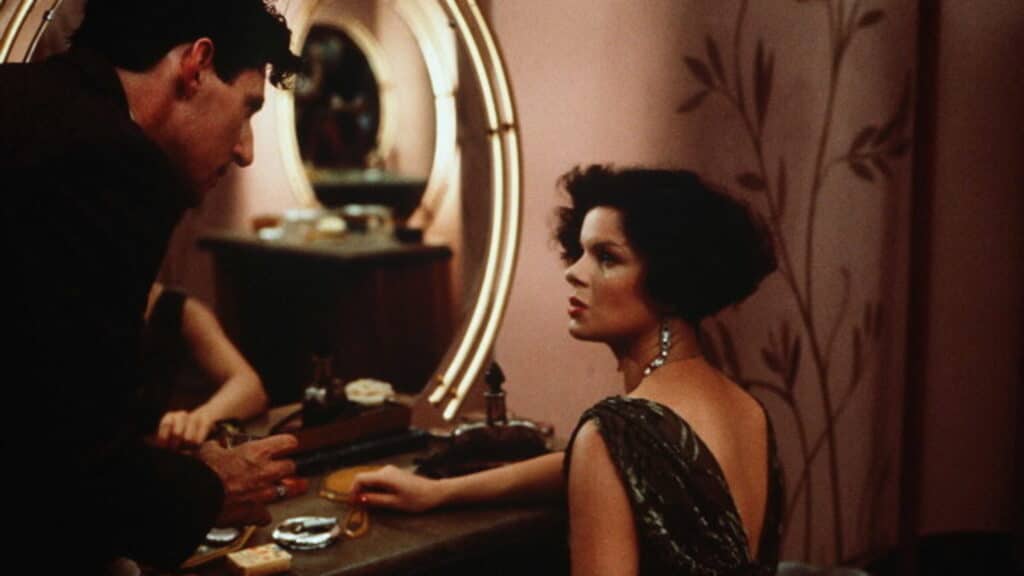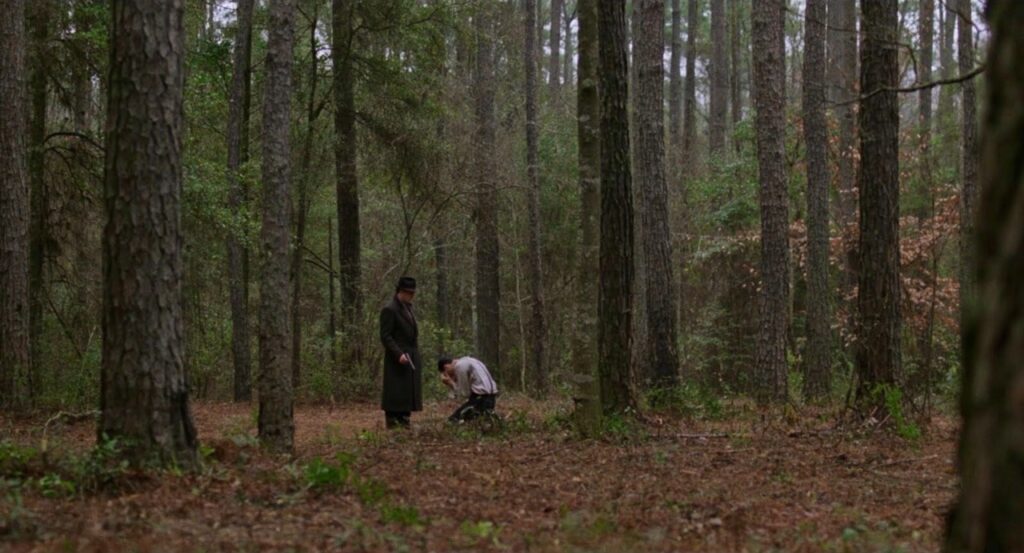A noticeable step up in their artistry at the time, the Coen brothers’ gangster pastiche remains the duo’s crown jewel.
If you were to gather a roomful of film buffs and ask them to name Joel & Ethan Coen’s best film, there’s an excellent chance most of their films could find a proponent or two. Some might go for such popular hits as Raising Arizona (1987), Fargo (1996), The Big Lebowski (1998), and O Brother, Where Art Thou? (2000). Others might lean towards artier fare like Barton Fink (1991), A Serious Man (2009), or Inside Llewyn Davis (2013). You might even find a couple of early adopters who feel that it was all downhill for them after they debuted with Blood Simple (1985).
I’m a fan of all the films cited above and the others in their considerable oeuvre. If I had to name my favorite, though, it’d probably be Miller’s Crossing (1990). It’s a gangster film homage, their first masterpiece, and the first evidence they could tell a rich story that didn’t rely solely on flowing blood, goofy slapstick, and an outrageous visual style.
The film is set in an unnamed Prohibition-era city under the control of criminal and political kingpin Leo O’Bannon (Albert Finney). In the mesmerizing opening scene, he’s listening to Johnny Caspar (Jon Polito), his counterpart in the Italian mob, as he announces that he plans to kill double-crossing bookie Bernie Bernbaum (John Turturro). This is more complicated than it sounds, however; Bernie, while admittedly a crook, is also the brother of Leo’s love, Verna (Marcia Gay Harden).
The besotted boss angers Leo by granting him full protection instead. Tom Reagan (Gabriel Byrne), Leo’s loyal right-hand man, advises against this. The refusal to give up Bernie could trigger a full-out gang war, and Tom even suggests that the only reason that Verna is with Leo in the first place is to ensure her brother’s protection. But this is more complicated than it sounds. While Tom is right about Verna, he’s also having an affair with her.

Despite Tom’s insistence that the situation with Verna and Bernie will lead to disaster, Leo can’t give either one up, not even after narrowly escaping an elaborate assassination attempt. With no other recourse, Tom finally confesses his affair with Verna to Leo, a move that succeeds in breaking them up, but which also inspires him to beat the shit out of Tom before expelling him. Tom then goes to Caspar in the hopes of getting a job with his gang. Caspar agrees but, as a test of loyalty, orders him to take Bernie out to the woods at Miller’s Crossing and shoot him.
Tom does so but, at the last second, is nevertheless compelled to do perhaps the closest thing in his life to a good deed. Without going into any more detail in deference to those who haven’t seen the film, it’s a good deed that he will find himself repeatedly paying for through an increasingly complex web of twists, betrayals, and strange twists of fate.
By the time Miller’s Crossing came out, it came with huge expectations among film fans based on the Coens’ previous efforts. It contained a number of the trademark items that had already turned up in their earlier efforts and would continue to do so in many of their subsequent works. It took the gangster genre and presented it through their own vision of colorful dialogue, complex visual set pieces, bursts of violence, and intricately executed action. It even threw in some in-jokes, including a couple of references to the then-unreleased Barton Fink, as well as items that take on talismanic properties as the story progresses.

The difference here is that from its opening frames, the Coens have clearly made a quantum leap artistically. Although their characters are squarely in the tradition of genre archetypes, they have the kind of recognizable human concerns to keep them from devolving into mere caricatures, thanks in no small part from the strong performances across the board. Finney’s work as Leo is all the more impressive when you consider that he stepped into the role at the last second when the originally cast actor, Trey Wilson, passed away just before filming was to begin.
The screenplay is as intricately constructed as anything they’ve ever done. In fact, it’s so intricate that the duo developed a case of writer’s block that eventually found them setting the script aside and banging out the screenplay for Barton Fink in three weeks before returning to it. And yet they present it in such a clean, efficient manner that, unlike so many other genre pastiches, the plot machinations never bog it down. It also showed their growing confidence as filmmakers as they dispense wild camera moves and create equally spellbinding scenes involving just a couple of people conversing amidst Dennis Gassner’s production design.
To these eyes, Miller’s Crossing contains three of the greatest scenes in their entire oeuvre, and two of them are entirely dialogue-based. The first is the intricate and increasingly contentious opening conversation between Leo and Caspar that finds the latter stressing the importance of “ethics” in their respective lines of work. The second is the scene when Tom takes Bernie out to Miller’s Crossing to be killed as Bernie begs him to “look into your heart” and spare him.
[The Coens] present it in such a clean, efficient manner that, unlike so many other genre pastiches, the plot machinations never bog it down.
The other great moment is the one time that the Coens allow themselves a stretch of purely visual pyrotechnics. It’s an eye-popping, dialogue-free scene in which Leo fends off an assassination attempt. He climbs out the window of his blazing mansion and calmly marches down the street firing a machine gun at a carful of fleeing attackers. All set to a soaring rendition of “Danny Boy” by Frank Patterson recorded for the movie, the Coens match the music and visuals to their exact specifications.
When Miller’s Crossing debuted in theaters, it, like the previous Coen brothers films, received rave reviews. Unlike those earlier efforts, however, it pretty much dropped dead in theaters. Part of this is because the film had the misfortune of coming out during a period when a bunch of highly anticipated gangster movies was being released. From Goodfellas to The Godfather III to State of Grace all in 1990, Miller’s Crossing got lost in the shuffle. Part of it may well have been that, unlike the infinitely warmer and cheerful Raising Arizona, it was a much chillier enterprise whose cool tone didn’t exactly lure many viewers into.
Because of the poor box office and its being followed up less than a year later with the Palme d’Or-winning Barton Fink, this is a film that people tend to overlook in the Coens’ filmography. And yet, despite the number of great films that they’ve made, this is the one that still stands head and shoulders above the rest.